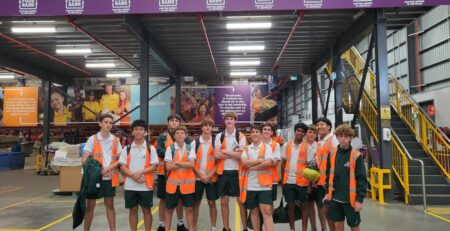Debating News: CAS Round 2
First III Debating Report
The second round of CAS Debates for the 2022 season took place last Friday, with the First III team going up against a formidable team from Cranbrook. The team this week was comprised of 1st speaker, V. Singleton (11WH), 2nd speaker, W. Taplin (11WH) and 3rd speaker, H. Davidson-McLeod (12Ta) and was tasked with arguing the topic: “That we should ban nations from selling or providing arms to the civilians of other countries under international law”. The team from Trinity was the affirmative side in this debate.
During the hour-long preparation time, the Trinity side identified that their burden of proof in the debate would be to prove that supplying weapons to civilians would do more to harm the civilians and nation than not sending them. With this in mind, we began identifying reasons why weapons would be needed in the first place and identified civil unrest or regional conflict as the main reason as why there would be a need for civilians to possess weapons. With this characterisation in mind, the team set about identifying ways in which weapons would only cause further unrest or conflict. Having prepared extensively and effectively in the preparation time, the team was well-equipped for what proved to be an interesting and challenging debate.
To open the debate, Trinity’s first speaker began by establishing a characterisation of the ways weapons in the hands of civilians only end up harming the civilians of a region. He backed this argument up with the example of the Afghanistan conflict, in which the supply of weapons into an area only resulted in the escalation of violence and failed to bring about the intended democratic solution. He also spoke heavily on the nature of foreign aid, emphasising that any foreign aid should seek to support a nation’s people through relief aid rather than through the supply of weapons that only incite violence. He also pointed out that if weapons should be supplied to another country at all, they should at least be supplied to the government, who would have the organisation and logistical capability to use them effectively.
The first speaker from Cranbrook responded to these claims by arguing that Trinity’s stance in the debate put them at odds with the fundamental concepts of self-determination and democracy, explaining that weapons in the hands of the people can be used as a means of freeing a nation’s people. They also questioned whether a ban under international law would even be effective, as there are nations such as Russia and China that choose to flout the regulations set by international law. They then went on to compellingly argue that arming civilians in oppressive regimes is imperative to bringing about democratic solutions in those regimes, arguing that civilians would, given the chance, spring to the opportunity to liberate themselves.
Trinity’s second speaker refuted this claim by outlining the fact that there are many sects and factions within every society. During a civilian uprising, the goals of the people will not always align, and there will be groups that attempt to exploit the situation to their benefit, potentially even attempting to install their own form of government. He then continued the debate by arguing that supplying weapons to civilians does not achieve the democratic solution promised by Cranbrook; but instead results in the total destabilisation of the region by creating opportunities for extremist groups to militarise. These extremists may then take advantage of the weakened state of government within a war-torn region by starting uprisings or using force of arms to extort others. He also made it clear that even if the conflict in a region were to end, civilians would still possess their weapons and would still be able to take advantage of a government recovering from war. This point was extensively supported by historical examples to outline the threat that civilian armament poses to the stability of a nation, using the Spanish Civil War as a prominent example of an instance where extremist uprisings were fuelled and encouraged by a supply of weaponry from foreign nations. He then went on to talk about the effectiveness of armed civilians as a combat unit, deducing that civilian militias would not be of any use in any form of combat as they would be untrained, unprofessional, and poorly organised.
Cranbrook’s second speaker replied to these arguments by pointing out that while there are extremist groups in unstable and oppressed regions, there are also groups that would be willing and able to take up arms to bring about a democratic solution. They then went on to argue the importance of democracy in regions, stating that the long-term benefits of a democratic nation far outweigh the short-term costs and blood spilled in the pursuit of that goal.
Trinity’s third speaker then summarised the affirmative team’s case by speaking at length on the true nature of imperialist powers, the reasons different nations have stakes in the outcomes of conflict and the ways in which any form of intervention does not assist the outcome, especially when referring to the intervention of large military powers such as the United States. He used the example of Gaddafi’s Libya as an instance where foreign military intervention with the intent of freeing a regime’s people only ended up de-stabilising the nation further. He then went on to attack the heart of the opposition’s case, which rested on a vaunted idea of a great crusade for democracy, arguing that democratic nations do not necessarily improve or stabilise the lives of its citizens.
Cranbrook’s third speaker then concluded the debate by comparing what a war-torn or oppressed nation would look like under Trinity’s model versus Cranbrook’s model. He argued that Cranbrook’s model was best for the long-term benefit of the people of oppressed or unstable nations as it would result in the installation of democracy in these nations, despite the short-term loss of life needed to achieve that goal.
With both sides having argued their case, it was time for the adjudication. According to the adjudicators, it was the ultimate comparison between Cranbrook’s crusade for democracy and Trinity’s realistic view of the instability caused by supplying weapons that led to Trinity winning the debate, as they were able to prove that supplying weapons to civilians only supported extremist groups, reduced regional stability, and decreased the power of the government.
Overall, the debate was not only enjoyable, but also of very high quality, with both sides putting forward mature and lucid arguments. An immense level of skill is required to debate effectively at this level of sophistication, and all due thanks go to the coaching staff that guided the training process. The First III team eagerly anticipates next week’s debate, which will pit us against Waverley College.
W. Taplin (11WH)
















